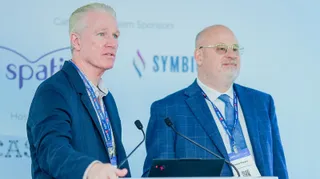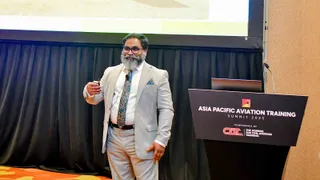An Interview with Dr. Monica Reed, CEO Florida Hospital Celebration Health
Contact Our Team
For more information about how Halldale can add value to your marketing and promotional campaigns or to discuss event exhibitor and sponsorship opportunities, contact our team to find out more
The Americas -
holly.foster@halldale.com
Rest of World -
jeremy@halldale.com
Interview with Dr. Monica Reed, CEO Florida Hospital Celebration Health at World Robotics Conference in Miami, Fl by Judith Riess, Editor, MEdSIM
MEdSim: Please give me some background on the Florida Hospital System
Dr. Reed: The Florida Hospital system is made up of 8 different hospital campuses in Central Florida under one license. Celebration Health opened its door in 1997 and was created to be a unique clinical environment that focused on health, healing and innovation. This cultural DNA allows an open platform to grow and to provide for the needs of our patients and to help shape healthcare as medicine advances. We have an excellent foundation that supports our quest for medical excellence. We have four key strategic pillars that focus our goals as an excellent Community Hospital: First and foremost we are here to serve our community. Our definition of community is truly global: 45 percent of our patients come from outside of our local community and almost 20 percent from either outside of Florida or the United States. We continually focus on providing evidence based care in an innovative clinical environment that meets the need of a diverse population.
Destination Services: realizing that we serve a global community and want to continue to do so we meet these needs by providing comprehensive and the most advanced minimally invasive surgical services.
Wholistic Health: believe in a holistic approach to medicine for our patients and our employees and that patient care and safety requires a holistic view (treating the whole patient not just the illness). This is incorporated into the patient care model for many of our destination services. Our Institute for Lifestyle Medicine and Healthy 100 program is focused on the prevention and performance enhancement model of care for patients, employees, physicians, corporations and our general community and incorporates the use of our 50,000 square foot fitness facility.
Living Laboratory: Celebration Health is focused on educating a global community of physicians and allied health professionals in the latest advances in healthcare. Our innovation unit and Nicholson Center allow us to partner with corporations, and venture philanthropists to create an environment for research and innovation.
MEdSim: When you recruit new doctors what do you look for?
Dr. Reed: We are looking for physicians that believe in excellent clinical care, are highly skilled leaders in their area of expertise, are willing to try different approaches to problem solving, are interested in technologies that improve medical care and are willing to conduct and be part of new training initiatives.
MEdSim: What do you feel is key for hospitals to provide better patient care and safety?
Dr Reed: As mentioned before, providing excellent care and treatment, having an interest in training whether through simulation, robotics or other new technologies to ensure medical competency. It is also important to being open to forming relationships with industry. Let’s partner to make instruments better in terms of patient care. We need to hold clinical conferences together, like this (Robotic Conference) that will allow us to have and you to develop better instruments, better simulations, better training that meets the needs of the doctor and the patient. In order to develop new instruments, simulations or models that assure they meet our needs requires open communication. We have to communicate to tell you what we need and you have to answer responsibly, not just for profit but to insure that whatever is produced/developed meets,/advances care and creates value for the patient and our healthcare delivery model.
MEdSim: How do you feel about using simulation to train?
Dr. Reed: Using simulation to train medical professionals is no longer a niche environment but a responsibility of hospitals. We owe it to ourselves as healthcare providers and to our patients to be as competent and skilled as possible. All doctors would like to assure their patients of the outcome of a surgery or an illness. We cannot but we can assure them that we are highly competent and well trained. The variation that we see in healthcare today can be substantially reduced by effective use of simulation training modules.
MEdSim: What can be done to enhance medical simulations and how can industry help?
Dr. Reed: The simulations must be reproducible and as close to what actually occurs in surgery or in treatment as is possible. For example, the haptic response . It has to be realistic enough to make doctors feel that they are in the actual environment. The only way to ensure competency is through education, training and practice. Practicing in a safe environment where we can “do no harm” leads to competent care. Having said that, it has to be affordable for hospitals, medical and nursing schools and medical simulation centers. Research has shown that physicians have less errors if they “warm up” through practice with video games, simulations, etc. Athletes “warm up”, lecturers practice before presentation, actors “rehearse” - we can do the same for the operating theatre.
We have to build a robust system to track physicians, not as a punitive measure but for skills attainment. They would begin with basic skill – then progress to advanced procedure – and finally refresher. Being able to time themselves on the procedures, their accuracy, their choices, leads to competency. The tool would allow the physician an administrator, professor, attending to know what skill needed refreshing, etc.
MEdSim: Where would you begin using simulation to train?
Dr. Reed: Simulation training should start in medical schools. Deborah Didactic course work is important and students also need to practice what is preached. Using simulation or a game based educational approach would help to acquire the needed skills. Simulation training allows us to advance in medicine from the old adage of “see one, do one, teach one”, to seeing and doing many, many times, and removes variation in teaching. Team training is needed and enhances our ability to offer safe reliable care and should include the different members of the health care team. Through a simulated environment you would be able to troubleshoot and solve problems. Team dynamics and training are so important to efficiency in the OR and on the floor.
We know simulation expands medical competency in a safe environment. Now we must develop the appropriate training and design tools that accurately measure levels of proficiency. If we are confident that the knowledge acquired transfers to the real world environment we will improve patient care and safety and reduce medical cost.
Editor's Note: As a physician, speaker, author, and CEO of Florida Hospital Celebration Health, Dr. Reed has dedicated her professional career to promoting health, healing, and wellness. Additional to her executive responsibilities for Celebration Health, Reed was recently promoted to Senior Executive Officer for Florida Hospital East and Florida Hospital Kissimee in 2009. In recognition of her accomplishments she has been recognized as one of the nation’s Top 25 Minority Executives in Healthcare by Modern Healthcare.
A graduate of Loma Linda University School of Medicine, who specialized in obstetrics and gynecology, Dr. Reed has also served as Florida Hospital’s chief medical officer, the associate director of Florida Hospital's Family Practice Residency program, and on the national stage as a medical news reporter for NBC and ABC affiliates in Alabama and Florida. Dr. Reed is the author of the recently released Creation Health BREAKTHROUGH, a book focused on 8 Principles healthy lifestyles.


